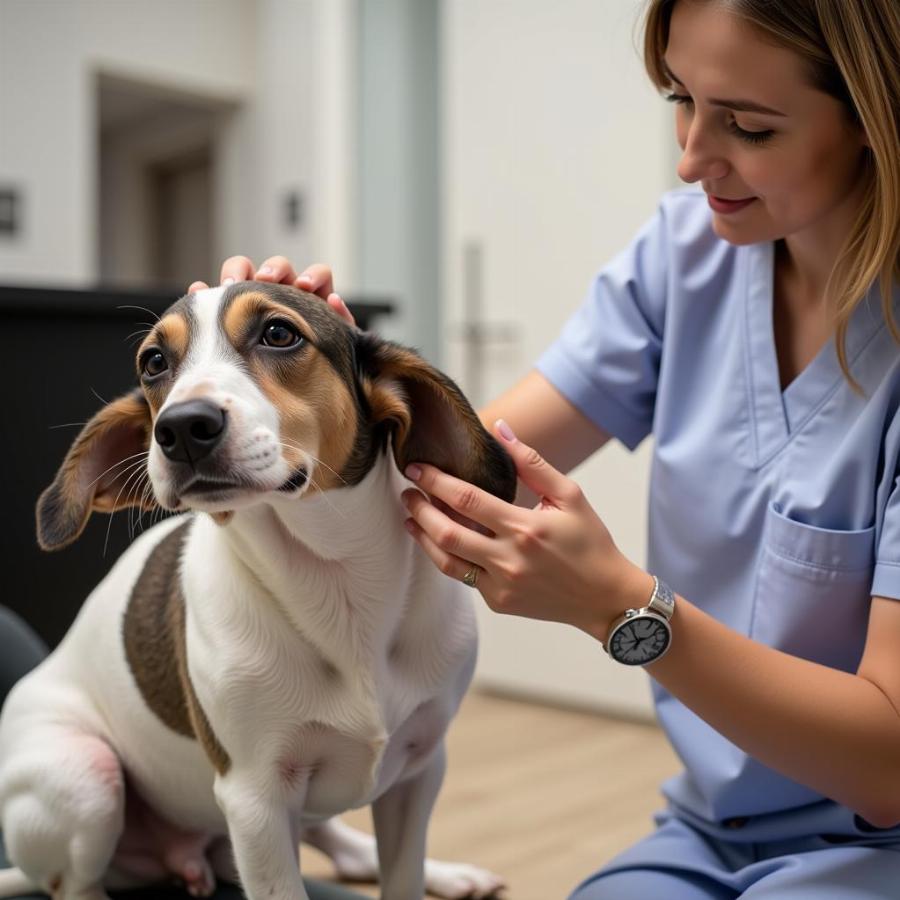A swollen dog’s ear can be alarming for any pet owner. Whether it’s a sudden puffiness or a gradual enlargement, understanding the potential causes, recognizing the symptoms, and knowing the appropriate treatment options is crucial for your furry friend’s well-being. This article provides a comprehensive guide to help you navigate this common canine health issue.
Understanding Swollen Dog Ears: Why Does It Happen?
Swollen ears in dogs can stem from various factors, ranging from minor irritations to serious infections. Identifying the underlying cause is essential for effective treatment. Some common culprits include:
- Ear Infections: These are a frequent cause of ear swelling, often accompanied by redness, discharge, and an unpleasant odor.
- Allergies: Allergic reactions to environmental allergens (pollen, dust mites) or food ingredients can manifest as swollen ears, often accompanied by itching and scratching.
- Ear Mites: These tiny parasites can infest a dog’s ear canal, causing intense itching, inflammation, and swelling.
- Hematomas: A hematoma is a collection of blood within the ear flap, typically caused by trauma (shaking the head vigorously, scratching). It results in a firm, fluid-filled swelling.
- Foreign Bodies: Grass seeds, foxtails, or other foreign objects lodged in the ear canal can irritate and inflame the ear, leading to swelling.
- Insect Bites or Stings: Bites or stings from insects like bees or wasps can cause localized swelling and pain in the affected ear.
Recognizing the Signs: How to Tell if Your Dog’s Ear is Swollen
While a swollen ear is often visually apparent, other accompanying symptoms can help pinpoint the cause. Look out for:
- Redness and warmth: The affected ear may appear redder and warmer than usual.
- Discharge: A yellowish, brownish, or bloody discharge can indicate an infection.
- Odor: A foul odor emanating from the ear is often a sign of infection.
- Head shaking or tilting: This suggests discomfort and possible ear pain.
- Scratching at the ears: Excessive scratching can indicate itching and irritation.
- Loss of appetite or lethargy: In severe cases, ear problems can cause systemic symptoms.
Treating a Swollen Dog’s Ear: What You Can Do
Treatment for a swollen dog’s ear depends entirely on the underlying cause. Never attempt to treat your dog’s ear without consulting a veterinarian. They will be able to diagnose the problem and recommend the appropriate course of action, which may include:
- Ear cleaning: Cleaning the ear with a veterinarian-approved solution can help remove debris, discharge, and mites.
- Medication: Antibiotics, anti-inflammatory drugs, or antiparasitic medications may be prescribed to address infections, allergies, or mites.
- Surgical drainage: In the case of a hematoma, surgical drainage may be necessary to remove the accumulated blood.
- Removal of foreign bodies: Your veterinarian will use specialized instruments to safely remove any foreign objects lodged in the ear canal.
What if My Dog’s Ear is Suddenly Swollen?
A sudden swelling in your dog’s ear can be concerning. It’s essential to seek immediate veterinary attention, especially if accompanied by signs of pain or distress. Prompt treatment is crucial to prevent further complications.
 Treating a Swollen Dog Ear
Treating a Swollen Dog Ear
Conclusion: Caring for Your Dog’s Ear Health
A swollen dog’s ear can be a sign of various underlying issues, from minor irritations to more serious conditions. Recognizing the symptoms and seeking prompt veterinary care are crucial for ensuring your dog’s comfort and well-being. Regular ear cleaning and preventative measures can help minimize the risk of future ear problems. Don’t hesitate to contact your veterinarian if you have any concerns about your dog’s ear health.
FAQ: Common Questions about Swollen Dog Ears
- Can I use over-the-counter ear drops for my dog? No, always consult your veterinarian before using any medication on your dog, even over-the-counter products.
- How can I prevent ear infections in my dog? Regular ear cleaning and keeping the ears dry can help prevent infections.
- Are certain dog breeds more prone to ear problems? Yes, breeds with floppy ears or hairy ear canals are more susceptible to ear infections.
- What if my dog’s ear swelling doesn’t go down with treatment? Contact your veterinarian immediately if the swelling persists or worsens despite treatment.
- Can allergies cause swollen ears in dogs? Yes, allergies can trigger inflammation and swelling in the ears.